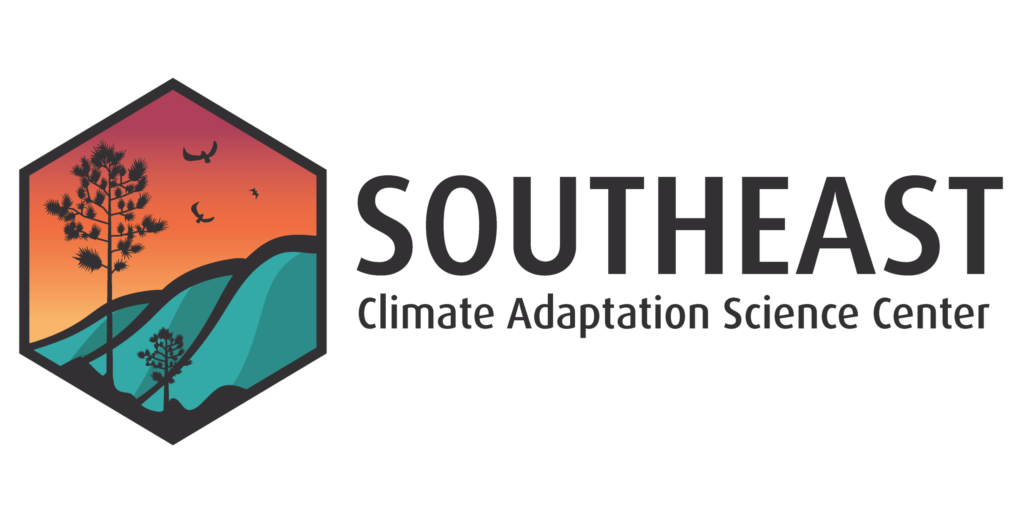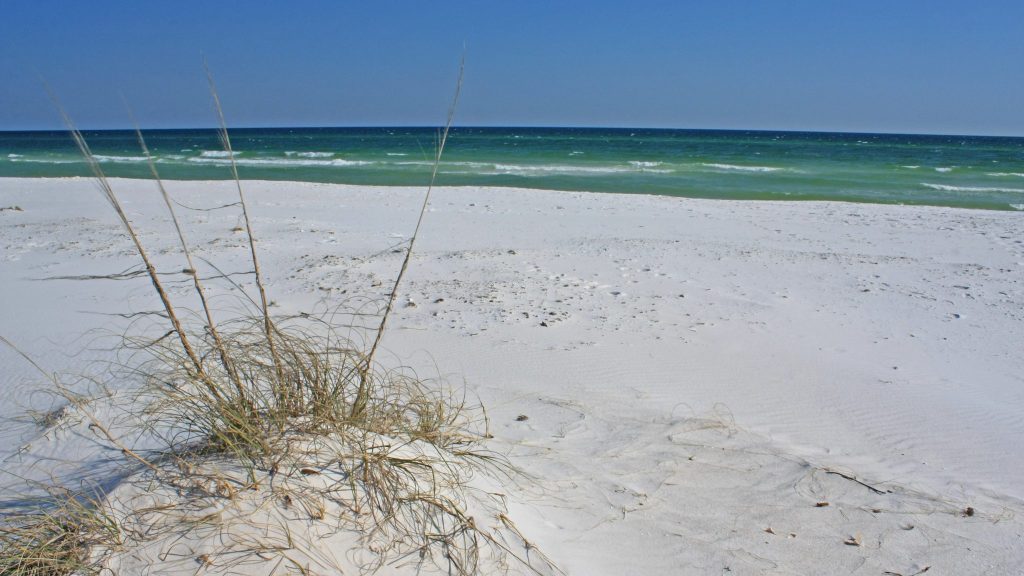May 2023 Newsletter


May 2023 Newsletter
Welcome to the Southeast Climate Adaptation Science Center’s May 2023 Newsletter.
For news and upcoming events related to the Southeast Climate Adaptation Science Center, subscribe to our monthly newsletter
SE CASC News | Resources | Publications | Tribal News | Partner News | Webinars | Events | Opportunities

Southeast Climate Adaptation Science Center News
Join the next virtual SE CASC Science Seminar, Insights from a National Scale and Holistic Approach to Map Estuarine Vulnerability to Projected Change in Water Quality, by 2019-20 Global Change Fellow Lise Montefiore (NCSU & Natrx), May 23, 11AM ET. Learn more and register.
Watch the recording of the SE CASC Science Seminar, Sea Level Rise and Salinity Impacts on At-risk Native Freshwater Mussels, presented by Joseph McIver on Apr. 20 here. Learn more.
SE CASC PIs Erin Seekamp (NCSU) and James Flocks (USGS) published Gulf Islands National Seashore Regional Sediment Budget Research and Data Needs: Workshop Series Summary, a product of SE CASC project, Enhancing Coastal Adaptation Planning at Gulf Islands National Seashore. 2021-22 Global Change Fellow Courtney Hotchkiss is co-author. Read a summary.
Researcher Spotlights: Learn more about Global Change Fellows Lily Raye & Bethany Wager.
Read new SE CASC informational products highlighting projects and initiatives for the Caribbean, Tribal Activities, and Global Change Fellows on our Fact Sheets page here.
Research Ecologist Adam Terando presented, How does a warming planet affect precipitation in the Southeast, during the April 2023 NOAA NIDIS Southeast Monthly Climate Webinar. Read a summary and watch the webinar here. Adam was also featured on the USGS Climate Science Champions video series. Watch the video here.
Congratulations to Global Change Fellow Emily Nastase for receiving the National CASC 2023 Science to Action Fellowship! Learn about her research and other 2023 S2A Fellows here. We caught up with Emily in the field to learn more about her work with the threatened Henslow’s Sparrow. Read more here.
Global Change Fellow Christina Perella traveled to Riverside,CA, to present her research. Read about her experience here.
Research Ecologist Mitch Eaton and PIs Simeon Yurek (USGS) and Micheal Allen (UF) are co-authors to, Quantifying uncertainty in coastal salinity regime for biological application using quantile regression.
2020-21 Global Change Fellow Justine Neville, Faculty Affiliates Ryan Emanuel and Marcelo Ardón are co-authors to Location and Design of Flow Control Structures Differentially Influence Salinity Patterns in Small Artificial Drainage Systems.
Faculty Affiliate Paul Armsworth (UTK) is co-author to, Leveraging federalism for flexible and robust management of social-ecological systems.
Faculty Affiliate Daniel Obenour (NCSU) co-authored Estimating the benefits of stream water quality improvements in urbanizing watersheds: An ecological production function approach.
Conservation Corridor: Ants disperse seeds farther in habitat patches with corridors.
SE RISCC: The next SE RISCC Webinar, Invasive Species Habitat Tool: INHABIT, will be presented by Catherine Jarnevich (USGS) on May 18 at 1PM ET. Register here.
Project Spotlight
Enhancing Coastal Adaptation Planning at Gulf Islands National Seashore

Barrier islands are subject to natural and anthropogenic changes, such as hurricanes, sea level rise and dredging. This project enhanced ongoing research at Gulf Islands National Seashore related to cultural resource adaptation planning and identified priorities for future research to better conserve the cultural and natural resources on the barrier islands. The research team shared information with NPS and other regional managers about sediment transport and management and worked to identify important research and data needs. The project will enhance efficiency in adaptation planning of vulnerable coastal resources and inform future projects to help predict changes of barrier islands and reduce the negative impacts associated with improperly placed dredge material. Learn more about this project here. Project PIs Erin Seekamp (NCSU) and James Flocks (USGS) recently released a workshop series summary for the project.
Resources
Fish Passage Portal. This tool provides landowners and public lands managers the tools to find funding across the federal government, as well as access to data, planning, and geospatial information. Learn more.
Planning Tools for Combatting Extreme Heat. The Biden-Harris Administration released a summary of tools available for addressing extreme heat for both people and nature. Learn more.
American Flood Coalition: State Resilience Partnership. The State Resilience Partnership launched the first phase of its new website developed to curate expertise and research on state-level flood resilience. Learn more.
At the USGS, Amphibians are Out of Sight but Top of Mind. During Amphibian Week, USGS released a featured story about amphibians and the work being done to manage them. Learn more and explore two USGS amphibian tools: National Amphibian Atlas and Amphibian and Reptile Species Distribution Explorer.
Coastal Change Likelihood: A synthesis of factors that determine future coastal change. The U.S. Geological Survey along with the National Park Service developed an assessment framework that synthesizes existing datasets that cover a variety of landscapes and hazards to evaluate the likelihood of coastal change along the U.S. coastline on a decadal scale. Learn more.
In the Media
USGS releases great new coastal data product: Future coastal hazards along the U.S. North and South Carolina coasts | Coastal News Today
Federal grant lets NC dam removal project move forward | Blue Ridge Public Radio
Can We Still Limit Global Warming to 1.5°C? Here’s What the Latest Science Says | Union of Concerned Scientists
Elevating Climate Adaptation Research Through Collaboration | Environmental and Energy Institute
Water Everywhere: Big Winter Stories | The University of Arizona

Notable Publications
Climate change and wetlands in the Southern Great Plains: How are managers dealing with an uncertain future?
Wetlands in the Southern Great Plains (SGP) offer valuable ecosystem services, such as providing habitat for a variety of birds, amphibians and invertebrates and a stopover habitat for migratory shorebirds and waterfowl. Unfortunately, climate change is contributing to a future fraught with rising daily temperatures and increasing variability of precipitation patterns. With a future so variable, wetland managers are left developing short-term reactive measures to prevent the loss of wetland function. To better understand the perceptions of land managers and provide effective adaptation strategies, a survey was conducted and sent to wetland managers and biologists across the SGP region. Results revealed that a majority of managers believe they are experiencing the effects of climate change, noting the changes in the timing of water availability as a major impact. Managing native and invasive plant species was determined to be the top adaptive measures taken by the managers. Barriers to additional action include limited funding and personnel along with uncertainty over climate change effects on wetlands. With a better understanding of current adaptive efforts pursued along with the barriers that impede further action, this project can facilitate a larger discussion on how to address the impacts of climate change on wetlands. Link to article.
Fern Cave: A Hotspot of Subterranean Biodiversity in the Interior Low Plateau Karst Region of Alabama in the Southeastern United States
The Fern Cave System, located in Jackson County, Northeastern Alabama, is the most extensive cave system in the state of Alabama. It is a global hotspot for cave-limited biodiversity and provides refuge for the federally endangered Gray Bat (Myotis grisescens) when it overwinters. This study created an updated list of troglobiotic (living in caves above water table) and stygobiotic (living in ground water systems) species for the Fern Cave System. The total list of cave-limited fauna included twenty-seven species with nineteen troglobionts and eight stygobionts. There are multiple factors that have contributed to the Fern Cave System’s unique diversity: high dispersal potential of cave fauna along the Southern Cumberland Plateau, high surface productivity, organic input from a large bat colony, favorable climate throughout the Pleistocene (geological epoch characterized by its extensive ice sheets and glaciers), and location within larger regional hotspot of subterranean biodiversity. Nine species of conservation concern live within the system due to their small range sizes, few occurrences, and several potential threats. Much of the Fern Cave System’s 25 km of mapped passage has yet to be bioinventoried and is undersampled. Through continued research in comprehensive sampling of this system, new diversity may be discovered across cave-limited taxa. Link to article.
The “Nuts and Bolts” of Doing Coproduction: Exploring Implementation Decisions in Climate Adaptation Research with Stakeholders
Coproduction is known as the collaboration between managers, scientists, and stakeholders to jointly define and solve a research problem. Open dialogue and transparency amongst researchers and stakeholders promotes the opportunity for more relevant research and subsequently a greater impact on communities, specifically in the context of climate adaptation strategies. Unfortunately, if done carelessly, coproduction can pose several threats through hindering relationships and exacerbating inequalities. To prevent these negative consequences, researchers performed a pilot project coproducing climate adaptation knowledge and strategies in six rural communities. They identified eight questions that researchers must consider when coproducing science with these communities. Questions covered the following topics: community recruitment, community champion selection, participant makeup, geography, clarifying expectations, timing, prioritization, and next steps. This pilot project along with the eight designed questions can guide conversations and discussions on the trade-offs present when researching and coproducing with communities to improve support for communities on the frontlines of climate impacts. Link to article.
Acceleration of U.S. Southeast and Gulf coast sea-level rise amplified by internal climate variability
Mean sea level (MSL) rise along the North American East and Gulf coasts has generally been rising faster than the global mean. However, local scale detection has been affected considerably by natural variability and the role it plays in MSL rise. Therefore, it is important to continuously monitor MSL to assist in early detection of these accelerating rates and thus limit uncertainties in projections. This project utilized tide gauge records to explore MSL acceleration along the U.S. Southeast and Gulf Coasts. Results reported acceleration rates of more than 10 mm/year since 2010 – a rate unprecedented in at least 120 years. This recorded acceleration is primarily due to an ocean dynamic signal exceeding externally forced response from historical climate models. However, this study found that this exceedance is the likely result of a superposition of an externally forced acceleration predicted by climate models along with internal North Atlantic decadal variability, specifically Rossby waves. MSL rates along the U.S. Southeast and Gulf Coast will likely return to average rates predicted by climate models within the next decade. Therefore, the ongoing acceleration in MSL can be defined as the compounding effect of external forcing and internal climate variability. This study revealed that while the early detection of acceleration signals is required for near-term planning, comparisons with climate model projections must be done carefully. Having a thorough understanding of MSL accelerations at the regional scale is vital for accurate sea-level projections. Link to article.
Predicting climate change impacts on poikilotherms using physiologically guided species abundance models
To appropriately adapt to a changing climate, it is important to accurately predict species distributions and abundance. However, such predictions can be quite uncertain, especially when temperatures exceed the bounds of observed data. This project proposed a physiologically guided abundance (PGA) model to predict temperature impacts on geographical distribution and abundance of poikilothermic animals. Poikilotherms are known as “cold-blooded” organisms and thus are very sensitive to external temperatures. This model combines observational data on species abundance and environmental conditions with laboratory-derived data on the physiological response of poikilotherms to temperature. It also includes uncertainty from laboratory-derived thermal response curves and offers estimates of thermal habitat suitability and extinction probability. The PGA model predicted that cold-adapted species would be extirpated in 61% of the locations they inhabit. Such a finding was never predicted in previous correlative niche models. Therefore this study revealed the necessity of incorporating species-specific physiological constraints when developing more realistic predictions of local extirpation and changes under warming conditions. Link to article.

Tribal News
Visit USET Climate Change Headlines for updates on information regarding climate science events, funding opportunities, best practices, and highlights from across the USET region.
Registration is now open for the 2023 USET Tribal Climate Resilience Camp from July 11-14 at the Avila Center in Durham, NC. Learn more and register.
National CASC developed a new Tribal Liaison Handout containing information on the Liaison Program, how it supports Tribes and Tribal Organizations, and contains contact information for the current Tribal Liaisons, available here.
In case you missed it, recordings from the Introduction to Climate Modeling workshop, hosted by USET, USFS, SC CASC, and SE CASC are available here.
A new documentary about the Penobscot Nation, This River is Our Relative is available for free viewing. Learn more and watch the documentary here.
The Sicangu Lakota (Rosebud Sioux) Tribe partnered with the Tribal Data Sovereignty Initiative and Lark Environmental, with technical support from South Dakota State University and the North Central Climate Adaptation Science Center, to create their Climate Adaptation Plan. Learn more.

Regional Partner News
SECAS: Lessons from Silicon Valley – What conservation planners can learn from the tech industry
SEAFWA: MINRC Student Fellows Now Part of the Profession
Association of Fish and Wildlife Agencies is Soliciting Full Proposals for 2024 Multistate Conservation Grant Program
NOAA Sea Grant announces $27M to further community-engaged marine debris removal and prevention

Webinars
Find more upcoming events in our calendar.
May 18 | 10-11:30am | Third Thursday Web Forum: The Southeast Conservation Blueprint Explorer and SECAS Atlas – New ways to access the Blueprint data
May 18 | 1pm-2pm | Southeast RISCC Management Network: Invasive Species Habitat Tool: INHABIT
May 18 | 3pm-4:30pm | NCASC Webinar Series: Incorporating Indigenous Knowledges into Federal Research and Management
May 23 | 11am-12pm | SE CASC Science Seminar – Insights from a National Scale and Holistic Approach to Map Estuarine Vulnerability to Projected Change in Water Quality
June 1 | 9am-10am | Climate and Conservation Coffee
June 2 | 12pm-1pm | North Central RISCC Spring Webinar: National Early Detection Rapid Response (EDRR) Information System
June 13 | 10am-11am | Southeast Climate Monthly Webinar
Upcoming Events
Jul. 11-14 | 2023 USET Tribal Climate Resilience Camp | Durham, NC
Jul. 25-27 | Indigenous Engagement Institute Workshop | Similkameen Valley in British Columbia, Canada
Oct. 16-19 | FEMA: 2023 Hazard Mitigation Partner Workshop | Virtual

Opportunities
Student Announcements
Pathways Program for Students & Recent Graduates To Federal Careers offers federal internship and employment opportunities for current students, recent graduates and those with an advanced degree. Learn more and apply here.
Hiring Announcements
Alaska Center for Climate Assessment and Policy is offering a Fellowship in Indigenous Evaluation in Alaska. The position is open until filled. Learn more.
University of California, Irvine is seeking Postbaccalaureate Fellows in the Climate Change & Environmental Justice Pool. Learn more and apply by May 31.
Tennessee Department of Energy & Conservation is seeking a Grants Program Manager. Learn more and apply by May 17.
Deep South Center for Environmental Justice is seeking 7 individuals to support Justice40 programming as Hub Outreach Coordinators. Learn more.
The Haskell Foundation seeks a postdoctoral research position focused on educational development for the Rising Voices, Changing Coasts Hub. Learn more and apply by June 1.
Nicholas Institute for Energy, Environment & Sustainability at Duke University and the Gund Institute for Environment at University of Vermont are seeking a Postdoctoral Associate: Effects of land and water management on biodiversity and carbon outcomes across the U.S. Learn more.
The Green Jobs Board posts environmental job opportunities with companies that prioritize sustainability and diversity, equity, and inclusion in their work. Learn more.
Funding Opportunities
National Science Foundation released a Dear Colleague Letter requesting planning proposals to spur innovative and inclusive wildland fire science through diverse collaborations. Concepts will be reviewed through May 31. Learn more.
Readiness and Environmental Protection Integration (REPI) Program released the FY2024 REPI Challenge Request for Proposals. Pre-proposals are due June 12. Learn more.
Conservation Science and Innovation in the Southeast funding opportunity has been released. Pre-proposals are due May 31 and full proposals by June 30. Learn more.
Miscellaneous
Association of Fish and Wildlife Agencies Climate Adaptation Leadership Awards for Natural Resources is seeking nominations. Learn more and submit nominations by May 31.
USGS scientists and partners are calling citizen scientists in the Florida Panhandle to help monitor diamondback terrapins. Learn more.
U.S. Global Change Research Program is requesting public contribution until May 31 for updates to the 2009 Climate Literacy Guide. Learn more and attend listening sessions.
- Categories:
